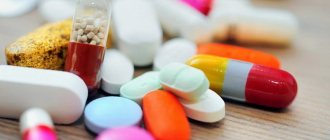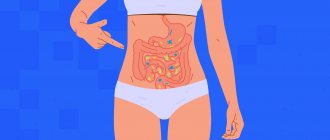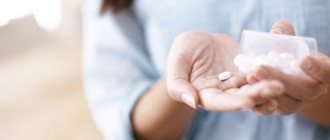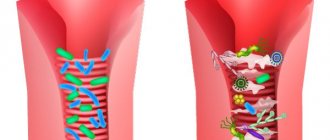Recovery after antibiotics is important for health!
The discovery of antibiotics became a milestone in the development of not only medicine, but also society as a whole. Such effective drugs, of course, naturally have side effects. However, the benefits of antibacterial agents are so pronounced that their use, despite the high prevalence of side effects, will not stop. Among the side effects of almost all antibiotics, the most common is indigestion in the form of stool upset and the occurrence of anbitiotic-associated diarrhea. Moreover, recently the incidence of antibiotic-associated diarrhea has increased. The modern lifestyle of a modern person, the lack of time to visit a doctor and self-medication with antibiotics, the availability and over-the-counter sale of antibacterial agents in pharmacies have led to a high prevalence of digestive problems and diarrhea during or after taking antibiotics. The incidence of antibiotic-associated diarrhea (AAD), depending on the class of drugs used and the effect of predisposing factors, can vary from 3 to 29%. Up to 40% of all cases of antibiotic-associated diarrhea are associated with Clostridium difficile infection. Colitis caused by C. difficile is considered the most common cause of diarrhea,
Reaction of intestinal microflora to antibiotics.
The development of AAD is associated with impaired functioning of the intestinal microflora. In parallel with the destruction of pathogenic microorganisms, antibacterial agents negatively affect the microflora of the intestine, genitourinary system, etc. As a result, the number of “useful” bacteria that help us absorb nutrients, participate in the production of vitamins, determine the normal functioning of the intestines, and regulate the frequency of stools decreases. Beneficial bacteria are bifidobacteria and lactobacilli, which die when exposed to antibiotics, and their number sharply decreases. Instead of bifido- and lactoflora, opportunistic microbes begin to grow in the intestines, leading to digestive disorders, causing diarrhea, abdominal pain and other symptoms.
As a result of a decrease in the number of bifidobacteria and lactobacilli in the intestine during antibacterial therapy, the metabolic function of the intestinal microflora is disrupted. Impaired digestion and absorption of carbohydrates and fiber itself leads to osmotic secretion of water and osmotic diarrhea. Also, bifidobacteria and lactobacilli break down fiber into short-chain fatty acids (SCFA), which provide intestinal cells with energy carriers and improve the trophism of the mucous membrane. A decrease in the synthesis of SCFA leads to dystrophic changes in the integumentary epithelium, the permeability of the intestinal barrier to antigens of food microbial origin increases, and the absorption of water and electrolytes is impaired. Due to changes in the composition of normal intestinal microflora, the deconjugation of bile acids is disrupted. An excess of primary bile acids, which are powerful stimulants of intestinal secretion, leads to secretory diarrhea. Violation of the protective function of intestinal microflora under the influence of antibiotics leads to a decrease in colonization resistance, that is, the ability of normal intestinal microflora to effectively suppress the growth of pathogenic microorganisms is reduced. With a decrease in the number of anaerobes of normal intestinal microflora, competition with pathogens for receptors of the intestinal mucosa weakens, local immunity decreases - the production of lysozyme and immunoglobulin A. In the created favorable conditions, the progressive reproduction and growth of pathogenic flora, in particular Clostridium difficile, begins. The pathological effect of pathogenic flora and microbial toxins leads to damage to the mucous membrane of the colon, inflammation, diarrhea and colitis.
Restoration of microflora after taking antibiotics.
You can restore the functioning of the gastrointestinal tract after taking antibiotics or prevent complications of antibiotic therapy by normalizing the intestinal microflora. It is possible to maintain and restore your own individual intestinal microflora and populate the intestines with microorganisms representing normal intestinal microflora using special means - probiotics. Probiotics contain live microorganisms that have a therapeutic effect; they populate the intestines, fight opportunistic flora and improve the functioning of the digestive system.
Probiotic microorganisms help restore normal functioning of the gastrointestinal tract and improve digestion. In addition, probiotics perform other functions that are normally inherent in normal intestinal microflora: they strengthen the body’s immune defense, produce vitamins B, K, etc.
Probiotics contain industrial probiotic strains of microorganisms (bifidobacteria, lactobacilli, etc.), and each culture of microorganisms must be present in quantities of at least 1x10 8 CFU. The effectiveness and safety of using probiotics has been proven and is beyond doubt.
The presence of an individual composition, concentration ratio and strains of certain bifido- and lacto- and other bacteria-representatives of the normal intestinal microflora is absolutely necessary with a competent approach to improving the functioning of the gastrointestinal tract.
Among the probiotic preparations, we can highlight FLORASAN preparations, which are created for each specific patient, taking into account the cause that caused the disruption of intestinal function. It is FLORSAN A that is used to restore impaired functions of the gastrointestinal tract and normalize the intestinal microflora in persons with acute stool disorders when treated with antibacterial agents. The largest Russian scientists in the field of gastroenterology participated in the creation of FLORASAN probiotics. Clinical trials of the drug FLORSAN were and are being carried out in the leading gastroenterological clinic of Russia under the leadership of the chief gastroenterologist of the Russian Federation, academician of the Russian Academy of Medical Sciences V.T. Ivashkin in the clinic of propaedeutics of internal diseases, gastroenterology and hepatology named after V.Kh. Vasilenko First Moscow State Medical University named after I.M. Sechenov.
The composition of Florasan A contains a sufficient amount of not only bifidobacteria and lactobacilli (Bifidobacterium longum, not less than 1x109 CFU, Bifidobacterium bifidum not less than 1x109 CFU, Lactobacillus rhamnosus not less than 1x109 CFU), but also Saccharomyces cerevisiae lysate (0.5 g). It is medicinal Saccharomycetes that have proven an undoubted effect in the treatment of antibiotic-associated intestinal lesions according to the results of clinical studies. Thus, Florasan A has a therapeutic effect, destroying the growth and reproduction of pathogenic microflora, but also restores the composition of the microflora by populating the gastrointestinal tract and genitourinary system with bifidobacteria and lactobacilli.
How to reduce the harm of antibiotics: useful tips
Home — Social networks — How to reduce the harm of antibiotics: useful tips
They have been talking about the insidiousness and harm of antibiotics for a long time: the drugs disrupt the intestinal microflora, and if taken frequently and chaotically, they stop helping altogether. But if you really can’t do without them, then how to prevent negative consequences?
What are the harms of antibiotics?
1. An antibiotic kills all bacteria.
It would seem, well, great!
However, not all bacteria are harmful. The intestines alone are home to 2 kg of beneficial microorganisms, not to mention those that live in the nasopharynx and reproductive system. “The mucous membrane of the gastrointestinal tract contains about 80% of immune cells, so the ability to resist infections directly depends on the state of the intestinal microflora
,” says Mikhail Shevyakov, professor of the department of clinical mycology, allergology and immunology at Northwestern State Medical University. I. I. Mechnikova. Therefore, the intestines are given the proud title of immune organ. Deprive it of the bacterial population, and the functioning of the entire organism will be disrupted.
And the most annoying thing is that after finishing a course of antibiotics, pathogenic microbes are capable of seizing power in the intestines (and in the vagina, too). Then you will have to treat complications for a long time and persistently. If the drug is chosen incorrectly, a generally absurd situation may arise: “bad” pathogenic bacteria will heroically resist the onslaught of the drug, and “good” ones will die. Cruel and unfair! And most importantly, the inflammation, contrary to expectations, will only expand.
2. The antibiotic stops helping if used frequently.
In the 19th century, most adult city residents died from pneumonia, which developed as a complication of the flu.
Now, thanks to the heroes of our article, we are insured against danger. However, mankind's passion for antibiotics has led to the fact that pathogens are gradually adapting to them
. In medical parlance, this is called “antibiotic resistance” - a global phenomenon that greatly frightens doctors.
“Due to uncontrolled use, medications stop working, and there is a risk that we will eventually return to the situation of the 19th century,” says Vladimir Rafalsky, clinical pharmacologist, head of research at the Ministry of Health of the Russian Federation; Doctor of Medicine, Professor. “Already, antibiotic resistance kills more than 25,000 people a year in Europe.” Can you guess what to do to prevent microorganisms from getting used to the drugs? Use medications less often! Quickly defeating a cold with the help of strong remedies “trains” the body to resist them, and when antibiotics are really needed, they may no longer work.
What to do if you take antibiotics:
Choose topical antibiotics.
Ask your doctor if possible to prescribe a topical medication. For example, women with certain inflammatory diseases in the vagina may be prescribed tablets or suppositories. The latter is a local antibiotic: it will kill those microorganisms that it “reaches”, but will not enter the bloodstream and will not spread throughout the body. This means that the effect of the drug will not affect the entire body and will not cause complications (intestinal dysbiosis, for example). There are local medications in the form of throat sprays, ointments and gels for external use.
Well, the systemic one must be swallowed in the form of tablets, capsules, syrups or received in injections and droppers. It will act everywhere and at the same time: we treat the throat - we get “thrush” as a side effect. Of course, systemic antibiotics are stronger and in some cases really necessary. Therefore, it is also not worth putting hard pressure on the doctor and demanding a local remedy.
Don't forget about antifungal medications.
“You can prevent dysbacteriosis, a violation of the flora of the mucous membranes of the gastrointestinal tract, vagina and urethra, by simultaneously taking antifungal drugs and probiotics,” says Aksana Tashmatova, general practitioner at SM-Clinic. The latter, as you know, are beneficial bacteria. They should be taken in parallel with antibiotics and thus populate the intestines with good microorganisms. For the best effect, you can diversify your life with probiotic candles. Antifungal drugs are needed to, as the name suggests, destroy harmful fungi that cannot be dealt with by an antibiotic - then they certainly will not take over the somewhat damaged microflora.
Eat properly.
In the process of taking antibiotics, pathogenic bacteria will die, and this waste must be removed from the body as quickly as possible - drink more and do not overload the body with heavy food.
You have been prescribed antibiotics
Antibiotics are a powerful weapon against bacteria - pathogens of infectious diseases, which allows us to eliminate the cause of the disease. For a number of diseases they are simply vital. The success of treatment will depend on how correctly you take antibiotics, following all the necessary doctor’s instructions. Otherwise, the disease may take a protracted, chronic course or develop into a complicated form and require more serious treatment, including surgical treatment.
How to take antibiotics correctly?
1. Take antibiotics only in the dose prescribed by your doctor
. Reducing the dose leads to a decrease in the effectiveness of treatment.
2. Antibiotics should be taken at regular intervals.
The instructions for the drug indicate the frequency of administration. If it is indicated that the medicine should be taken 2 times a day, it means that this should be done every 12 hours, for example, at 8 am and 8 pm. If 3 times a day, it means every 8 hours, if 4 times a day, it means every 6 hours. This is necessary to maintain an adequate concentration of the antibiotic, at which the causative agent of the disease dies. These are not headache pills that you can take today but not tomorrow. Taking a medication once or skipping it will not cure the disease, but may cause the pathogen to become insensitive to the drug.
NB!
To avoid skipping an antibiotic dose, use these simple rules:
- take antibiotics at the same time you do a regular activity, such as brushing your teeth or eating. In this case, you should find out when you need to take the medicine - before or after meals;
- After each appointment, make a note in your diary or calendar;
- Set a reminder on your mobile phone or computer.
3. The effect of taking the antibiotic should appear within 3 days.
If, after starting to take an antibiotic, the symptoms of the disease decrease within 3 days: body temperature normalizes, the degree of weakness, cough, shortness of breath, etc. decreases, then this means that the ANTIBIOTIC ACTS the bacteria, and it is effective. If the condition does not improve, consult a doctor - you need to change the drug.
4. You must take the entire course of antibiotics
. If your doctor has prescribed a medicine for 10 days, you must take it for the full 10 days, even if you feel much better than when you started treatment. If you stop taking an antibiotic too early, some germs may survive in the body and continue to multiply. This can lead to another infection or the bacteria "mutating" into a new form that is resistant to treatment, which can lead to complications.
5. If you experience side effects while taking an antibiotic
(allergic rash, nausea, vomiting or something else), consult a doctor; the drug must either be replaced or additional medications taken that would eliminate the unpleasant condition (for example, antiallergic drugs).
Antibiotics and the gut
Antibiotic therapy, being an undoubted achievement of medicine in the mid-twentieth century, made it possible to cope with many serious infections, but it turned out to be by no means a harmless method of treatment. Antibiotic therapy can be accompanied by various adverse reactions, the frequency of which depends on the type of antibiotic, duration of the course, the presence of concomitant diseases, etc.
One of the most common side effects of antibiotics is intestinal disorders, which are manifested by the following symptoms:
- loose stool or diarrhea
- pain or discomfort in the abdomen,
- bloating.
According to some studies, antibiotic-associated diarrhea may develop in up to 35% of patients.
Symptoms most often appear on the 4th and 10th day from the start of antibiotic treatment, and in a third of patients, 4 weeks after discontinuation of antibiotics.
Risk factors for symptoms of intestinal dyspepsia when taking antibiotics:
- children under 6 years old
- elderly (over 65 years old)
- simultaneous use of 2 antibiotics (for example, therapy for H. pylori infection - Helicobacter pylori)
- long course (more than 3 days)
- repeat course (during the current year)
- Previous episodes of bowel symptoms associated with antibiotic use
- chronic gastrointestinal diseases
- severe concomitant diseases.
When several factors combine, the risk of developing intestinal symptoms increases significantly.
Vaginal microflora after antibiotics
Recovery from gynecological surgery is usually accompanied by a prophylactic course of antibiotics to prevent inflammation and other post-operative complications. For each patient, the attending physician selects his own drug. His choice depends on many factors: the general state of the woman’s immune system, possible allergic reactions, the nature of the surgery and much more.
Antibacterial drugs cause the death of bacteria that are sensitive to them, without discerning whether they are harmful or not. This becomes the reason that the vaginal microflora after antibiotics needs to be restored in the same way as the woman herself needs to be restored after surgery. It is especially important to pay attention to the health of the intimate area in order to improve overall well-being and prevent complications. Vaginal dysbiosis causes discomfort and leads to a deterioration in the woman’s general well-being, which can slow down recovery. In addition, the intimate area, left without protection in the form of healthy microflora, may become infected, and the vaginal mucosa may become inflamed, which will require separate treatment.
Here are some tips on how to reduce the harmful effects of antibiotics on the vaginal mucosa and on the body as a whole.
- Antibiotics should only be prescribed by a specialist. You should not self-medicate or change the prescribed drug on the “advice of a friend.”
- Taking such medications must be done strictly according to schedule, be sure to complete the full course, otherwise the risk of re-development of inflammation increases.
- It is better to take antibiotics after meals rather than on an empty stomach.
- Antibacterial drugs are best taken with vitamin complexes and antifungal drugs (after consultation with a doctor).
- While taking antibiotics, you should not drink alcohol.
- During the treatment period, you must adhere to a special diet that excludes everything smoked, spicy, fatty, fried and floury. Food should contain a lot of animal protein.
- After the course of treatment, you need to restore your immunity comprehensively - not only with vitamin supplements, but also with light daily exercise, for example, walking in the fresh air.
- During treatment, try to drink more fluids so that decay products of microorganisms and harmful substances are eliminated from the body faster.
- Daily intimate hygiene should be carried out only with the use of products specifically designed for these purposes. They help maintain the acid-base environment of the vaginal mucosa at the correct level, which helps inhibit the growth of pathogens.
Of course, any operation is extremely stressful for the fragile female body. And rehabilitation after it is often a long journey. However, step by step, any woman is able to find the strength in herself and go through it in order to be with her family and friends again and enjoy life.
Discomfort in the intimate area during this period prevents you from quickly returning to your usual lifestyle.
Tantum® Rose not only relieves discomfort (itching, pain and burning), but also helps restore the vaginal microflora after antibiotics, suppressing the growth of only pathogenic flora. Return to list of articles








